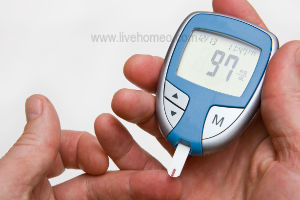Describe about Gestational Diabetes?
Gestational diabetes is high sugar that develops during pregnancy and usually disappears after giving birth. It occurs if your body cannot produce enough insulin that helps to control sugar levels. Sugar levels usually returns to normal soon after delivery in gestational diabetes.
Mother with gestational diabetes has increased risk of needing a caesarean section to deliver your baby, can have hypertension and an increased chance of getting urinary tract infections. Baby can also have problems like serious low glucose level soon after birth, born very fat and large at birth, Low levels of calcium and prolonged new-born jaundice.

Causes and symptoms of Gestational Diabetes :
Causes of gestational diabetes
In pregnancy, placenta produces hormones which help the baby to grow and develop; these hormones block the action of the mother’s insulin. This condition is called insulin resistance. Because of this insulin resistance, pregnancy women need insulin 2 to 3 times higher than normal. If you already have insulin resistance, then your body may not be able to cope with the extra demand for insulin production and the glucose level increase resulting in gestational diabetes.
Women are at risk of developing gestational diabetes if they have certain conditions like
- Overweight
- Over 25 years of age
- If they have family history of type 2 diabetes
- If they have polycystic ovary syndrome (PCOS)
- If they had gestational diabetes in previous pregnancy
- Having prediabetes.
Symptoms of Gestational Diabetes :
Women with gestational diabetes usually don’t have any symptoms. Doctors suggest a screening test for gestational diabetes when you’re 24 to 28 weeks pregnant. Common test conducted for gestational diabetes is oral glucose screening test. In this test how efficiently your body produce glucose is measured. Most of the women find out they have gestational diabetes after undergoing this test.
Some women when their sugar or glucose level is high (hyperglycaemia) have symptoms like increased thirst, dry mouth, tiredness and increased urinary frequency.
Tips for Gestational Diabetes :
Choosing the right food is important if you have gestational diabetes. Gestational diabetes can be managed by monitoring glucose levels, by healthy diet plan and regular physical activity. Effective management of gestational diabetes reduce the risk of complications during pregnancy and the birth of your baby. By following few health tips women can reduce the complications of gestational diabetes,
- By checking sugar levels regularly
- Proper and strict dietary schedule
- Physical exercise
- By increasing fibre intake
- Eat carbohydrates
- Have enough sleep
- Increase your protein intake
- Eat fresh fruits and vegetables
- Avoid sweet drinks, have sugar free dietjaundice
- Avoid junk and saturated fat food.
By Consulting your doctor and taking suggestions also helps to manage the risk and complications of gestational diabetes and helps both mother and child.
0

